Maison >développement back-end >tutoriel php >Configuration de la bibliothèque PHP jpgraph et génération de divers graphiques statistiques
Configuration de la bibliothèque PHP jpgraph et génération de divers graphiques statistiques
- coldplay.xixiavant
- 2020-08-04 15:57:122818parcourir

Introduction à JpGraph
JpGraph est une bibliothèque de génération de graphiques statistiques PHP open source, construite sur la base des graphiques GD2 de PHP bibliothèque. Encapsule les opérations associées à la génération de graphiques statistiques et masque certaines opérations complexes, ce qui facilite la sortie de graphiques statistiques sur la page PHP. Le site officiel de JpGraph est : http://jpgraph.net, où les développeurs peuvent télécharger gratuitement la dernière version de JpGraph et lire des documents d'aide ou des exemples de programmes associés.
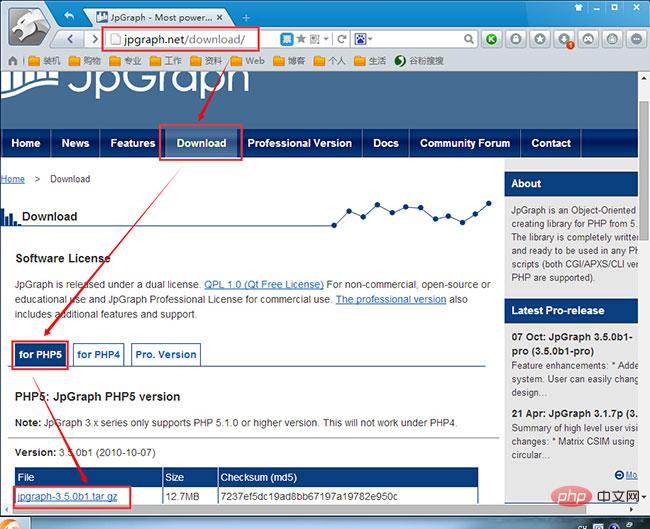
Recommandations d'apprentissage associées : Programmation PHP de l'entrée à la maîtrise
Configuration JpGraph
(1) Modifier le fichier php.ini
Ajouter le chemin du répertoire de jpgraph dans include_path, et décompresser le src de jpgraph Le le nom du répertoire est changé en jpg.
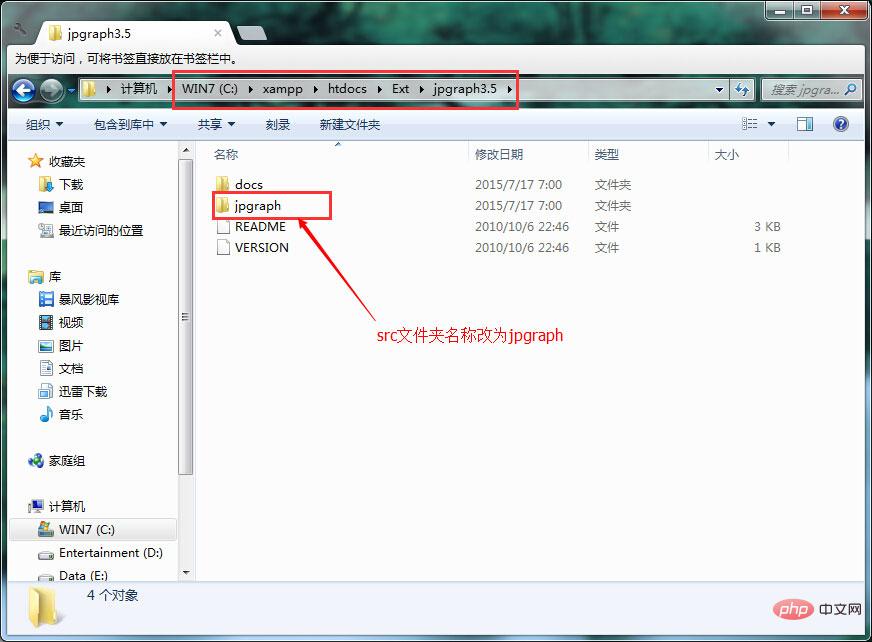

(2) Vérifiez si PHP prend en charge la bibliothèque GD
Recherchez la déclaration;extension=php_gd2.dll dans le fichier php.ini. Supprimez le signe ; avant l’instruction ci-dessus, c’est-à-dire supprimez le commentaire. Si vous ne trouvez pas cette instruction à cause des différentes versions de PHP, vous pouvez directement ajouter extension=php_gd2.dll
(3) Modifier le fichier jpgraph_gb2312.php
Trouvez la fonction : function gb2utf8($gb)
Modifiez la fonction en :
function gb2utf8($gb) {
return $gb;
}C'est-à-dire le code qui n'utilise pas l'encodage gb2 pour convertir en utf8.

Graphique linéaire
<?php
require_once ("jpgraph/jpgraph.php");
require_once ("jpgraph/jpgraph_line.php");
$data1 = array(523,634,371,278,685,587,490,256,398,545,367,577); //第一条曲线的数组
$graph = new Graph(500,300);
$graph->SetScale("textlin");
$graph->SetShadow();
$graph->img->SetMargin(60,30,30,70); //设置图像边距
$graph->graph_theme = null; //设置主题为null,否则value->Show(); 无效
$lineplot1=new LinePlot($data1); //创建设置两条曲线对象
$lineplot1->value->SetColor("red");
$lineplot1->value->Show();
$graph->Add($lineplot1); //将曲线放置到图像上
$graph->title->Set("CDN流量图"); //设置图像标题
$graph->xaxis->title->Set("月份"); //设置坐标轴名称
$graph->yaxis->title->Set("流 量(Gbits)");
$graph->title->SetMargin(10);
$graph->xaxis->title->SetMargin(10);
$graph->yaxis->title->SetMargin(10);
$graph->title->SetFont(FF_SIMSUN,FS_BOLD); //设置字体
$graph->yaxis->title->SetFont(FF_SIMSUN,FS_BOLD);
$graph->xaxis->title->SetFont(FF_SIMSUN,FS_BOLD);
$graph->xaxis->SetTickLabels($gDateLocale->GetShortMonth());
$graph->Stroke(); //输出图像
?>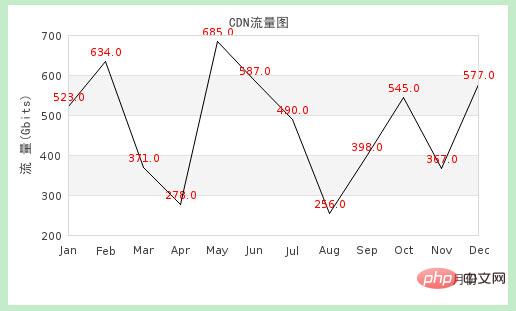
Diagramme à barres
<?php
require_once ("jpgraph/jpgraph.php");
require_once ("jpgraph/jpgraph_bar.php");
$data = array(19,23,34,38,45,67,71,78,85,87,96,145);
$ydata = array("一","二","三","四","五","六","七","八","九","十","十一","十二");
$graph = new Graph(500,300); //创建新的Graph对象
$graph->SetScale("textlin"); //刻度样式
$graph->SetShadow(); //设置阴影
$graph->img->SetMargin(40,30,40,50); //设置边距
$graph->graph_theme = null; //设置主题为null,否则value->Show(); 无效
$barplot = new BarPlot($data); //创建BarPlot对象
$barplot->SetFillColor('blue'); //设置颜色
$barplot->value->Show(); //设置显示数字
$graph->Add($barplot); //将柱形图添加到图像中
$graph->title->Set("CDN流量图");
$graph->xaxis->title->Set("月份"); //设置标题和X-Y轴标题
$graph->yaxis->title->Set("流 量(Mbits)");
$graph->title->SetColor("red");
$graph->title->SetMargin(10);
$graph->xaxis->title->SetMargin(5);
$graph->xaxis->SetTickLabels($ydata);
$graph->title->SetFont(FF_SIMSUN,FS_BOLD); //设置字体
$graph->yaxis->title->SetFont(FF_SIMSUN,FS_BOLD);
$graph->xaxis->title->SetFont(FF_SIMSUN,FS_BOLD);
$graph->xaxis->SetFont(FF_SIMSUN,FS_BOLD);
$graph->Stroke();
?>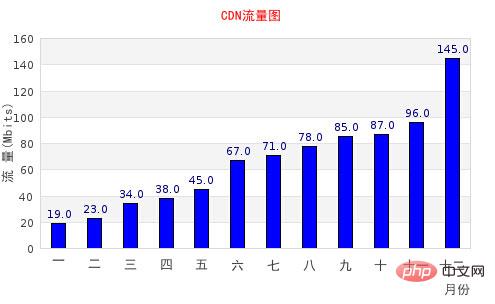
Graphique circulaire
<?php
require_once ("jpgraph/jpgraph.php");
require_once ("jpgraph/jpgraph_pie.php");
require_once ("jpgraph/jpgraph_pie3d.php");
$data = array(19,23,34,38,45,67,71,78,85,87,90,96);
$graph = new PieGraph(550,500);
$graph->SetShadow();
$graph->title->Set("CDN流量比例");
$graph->title->SetFont(FF_SIMSUN,FS_BOLD);
$pieplot = new PiePlot3D($data); //创建PiePlot3D对象
$pieplot->SetCenter(0.4, 0.5); //设置饼图中心的位置
$pieplot->SetLegends($gDateLocale->GetShortMonth()); //设置图例
$graph->Add($pieplot);
$graph->Stroke();
?>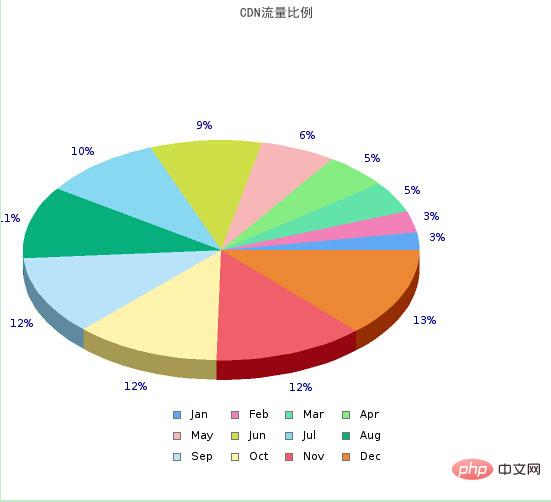
Ce qui précède est le contenu détaillé de. pour plus d'informations, suivez d'autres articles connexes sur le site Web de PHP en chinois!

